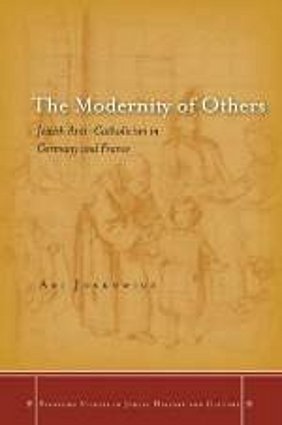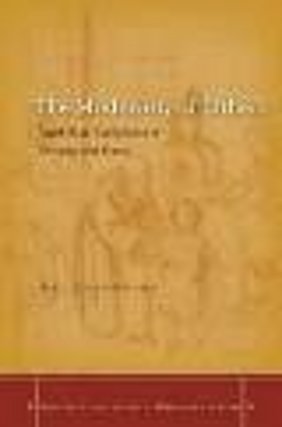As European liberals advanced their political and socioeconomic vision over the course of the long nineteenth century, one of the most consistent targets of their hostility was the Catholic Church. In a time of waxing democratization, they lamented that the church's hierarchy remained wedded to outmoded monarchic structures and demanded unblinking obedience from the faithful. In an age of stunning advances in the sciences, Catholics clung instead to ancient dogmas that defied reason. In an era of nationalist enthusiasm that was remaking the map of Europe, the church promoted supranational identities and allegiances. Ari Joskowicz offers a fascinating history of Jewish engagement in anti-Catholic rhetoric in nineteenth-century Germany and France in The Modernity of Others. He demonstrates how anti-Catholicism emerged as an important component in Jewish thought, and he explores the trajectory of the phenomenon and the motivations that inspired it.
While Jews were by no means of one mind on the issue, Joskowicz argues that for a significant number of Jewish intellectuals and leaders, lending their voices to the anti-Catholic chorus offered opportunities to align themselves with the emerging liberal establishment and to claim for the Jewish community the qualities that purportedly were so lacking among Catholics (rationality, modern mindedness, manliness, patriotism, etc.). It was a chance, in other words, for a maligned minority to shake off longstanding perceptions of foreignness and to win respect as an integral component of the European order. In the process of advancing this argument, Joskowicz also seeks to broaden our understanding of secularism in nineteenth-century Germany and France. The traditional secularization thesis emphasizes the steady erosion of religion's persuasiveness among educated Europeans and its gradual banishment from the public sphere. As Jews assimilated into the mainstream, they grew more estranged from the religious beliefs and practices of their ancestors. Building on more recent scholarship on the subject, Joskowicz advocates for multiple secularisms, including the recognition that secularism often entailed not the abandonment of religion so much as the reevaluation of its proper place in society. Many of the Jews engaged in anti-Catholic discourse were denouncing a certain kind of religion ("fanaticism"), while simultaneously advocating for the importance of more decorous expressions of religion as integral features of a stable, modern society.
The Modernity of Others is a work of intellectual history, focusing squarely on the writings and public statements of Jewish intellectuals and leaders. The bulk of it consists of a chronological account of Jewish anti-Catholicism over the long nineteenth century, with an introductory survey of the early modern period and a concluding glance forward into the twentieth century. Its structure is transnational, with each chapter alternating between developments in Germany and France.
Joskowicz's first chapter provides a broad intellectual context, offering a sweeping review of the entangled, reinforcing trajectories of anti-Catholic and antisemitic discourse from the start of the Reformation to the late nineteenth century. In highlighting the similarities and differences, Joskowicz notes that the central stereotype applied to Jews was foreignness, while for Catholics it was irrationality and resistance to modernity. Both populations endured calumny, harassment, and occasional violence, though the stakes were higher for Jews considering their modest numbers and greater vulnerability. Overall, it is a helpful survey, though the portrait of antisemitism could have been more robust. The core thrust of Joskowicz's book is charting how Jews were also speaking about themselves and articulating their aspirations by engaging in anti-Catholic rhetoric. Applying a similar interpretive framework to antisemites would have also been especially illuminating.
Joskowicz's history of Jewish anti-Catholicism unfolds over the next six chapters, starting in the 1780s as a number of Jewish thinkers began to participate in Enlightenment-era diagnoses of Catholicism's ills. He concentrates on the writings of four thinkers: Moses Mendelssohn, Ephraim Moses Kuh, Moses Hirschel, and Zalkind Hourwitz. As they made common cause with other intellectuals on this issue, they shifted away from the traditional Jewish practice of forming "vertical alliances with the state and the monarch" (p. 91). Instead, this coterie of pioneers were forging "horizontal alliances" with like-minded Protestants and deists and demonstrating new possibilities for Jewish participation in civil society.
He next treats the Napoleonic era to the 1830s, a period that was marked intellectually and culturally by romanticism and politically by restorationist regimes. In France, a renewed alliance between throne and Catholic altar threatened newly won Jewish legal rights. In Germany, an increasingly influential romantic conception of state and society proved antithetical to aspirations of Jewish equality. Joskowicz analyzes the perspectives of four thinkers: Joseph Salvador, Léon Halévy, Saul Ascher, and Heinrich Heine. Each in his own way pushed back against Jewish marginalization, using anti-Catholicism as a foil "to create an enticing global interpretation of society that would change the way Judaism was perceived once religion and history were accepted as central resources of political debate" (p. 131).
The following chapter shifts to the 1840s, a time of renewed momentum among liberals accompanied by sharp critiques of the Catholic Church as an impediment to progress. Changes in Jewish life included rising economic fortunes, the development of a richer intellectual life and infrastructure, and the early stirrings of the Reform movement. Growing numbers of liberal-minded Jews voiced their antipathy toward Catholicism, in some instances issuing harsh condemnations that provided fodder for antisemitic attacks for decades to come. Joskowicz suggests that Jewish anti-Catholicism was rooted in Jewish aspirations for middle-class respectability. It also allowed Jews to articulate how a moderate, reasonable religion like Judaism could contribute to a healthy moral order in a modern nation-state.
Throughout much of the 1850s, the political environment in Germany and France discouraged Jewish anti-Catholicism. It reemerged with greater intensity in the 1860s, spurred on above all by the Mortara Affair. In 1858 the Catholic nanny of a gravely ill Jewish boy from Bologna named Edgardo Mortara baptized him. This made the boy a Catholic in the church's eyes, and Catholic officials had him taken from his parents and raised in Catholic institutions (he eventually became a priest). Mortara's fate outraged Jews across Europe, convincing large numbers that the Catholic Church, embodied above all in the papacy, was a uniquely fanatical and backward institution. Concurrent developments like the 1864 publication of the Syllabus of Errors and the debate over papal infallibility only reinforced this view. Jews routinely described their times as defined by conflict between the forces of progress and the blinkered dogmatism epitomized by the church, and anti-Catholic rhetoric provided a means of standing with progressives.
The book's sixth chapter takes a more thematic approach, investigating Jewish participation in parliamentary debates concerning religion in France and Germany from the 1840s through the 1880s. This excursus offers another vantage on how anti-Catholicism gave Jews a means to position themselves and their religion within larger frameworks. In the seventh and final chapter, Joskowicz traces the evolution of Jewish anti-Catholicism from the 1870s through the end of the century. In the freshly forged German Empire, the 1870s coincided with the peak of the Kulturkampf. Many German Jews lent their rhetorical support to the state-sponsored campaign to vilify and marginalize Catholic religious leaders, which offered them a means of expressing their patriotic belonging to an enlarged Germany. Jewish anti-Catholicism flared less brightly but more enduringly in France, with a final burst during the Dreyfus affair at the turn of the century. In both countries, Jews abandoned the discourse when its political advantages were overshadowed by its liabilities, especially its capacity to feed the gathering threat of antisemitism.
Jewish anti-Catholicism is an uncomfortable topic, not least because antisemites seized upon it in the second half of the nineteenth century to justify their resentments. To avoid the risk of echoing these arguments, many scholars have shied away from the subject. Others have been tempted to downplay Jewish anti-Catholicism as a relatively harmless reaction to the threat of antisemitism. To Joskowicz's considerable credit, he acknowledges the phenomenon's long history and provides a fair-minded accounting of the arguments and motivations of its leading exponents. He is careful to draw clear distinctions between Jewish anti-Catholicism and antisemitism, noting that Jews were "rarely hateful," focused much of their criticism on the clergy, and generally did not stigmatize or pathologize the entire Catholic population (p. 7). In delineating these contrasts, however, he risks trivializing the real costs imposed by anti-Catholic discourse and the actions it inspired. Catholics endured vilification, the abridgment of rights, and harassment and violence at the hands of the state and non-Catholic populations. Anti-Catholic rhetoric helped create the conditions for these abuses.
A prominent feature of Joskowicz's history is its focus on both France and Germany. The seminal distinctions he explores include different models of secularism (in Germany anti-Catholicism combined more readily with a recognition of religion's legitimate place in a well-regulated society), different models of nationalism (civil versus ethnic), and different rates of Jewish assimilation (progress was swifter in France). For the most part, his French and German histories stand side by side, with surprisingly little interpenetration and cross-fertilization. He draws some intriguing similarities and contrasts and succeeds in demonstrating the importance of context in shaping Jewish anti-Catholic rhetoric. These goods come at a cost, though. His decision to tell two stories discourages him from delving as deeply in either one as he could have. It also leads him to gloss over related questions that merit inspection. In particular, I found myself wanting to know more about the reception of Jewish anti-Catholic rhetoric by Catholics and non-Jewish proponents of anti-Catholicism.
The aforementioned concerns pale in comparison to the book's core strengths. The Modernity of Others is a carefully researched and eminently readable study of a neglected topic that deserves a wide audience. It should be of particular interest to scholars of modern Judaism, Jewish-Catholic relations, and Europe's long nineteenth century.



